The essential features of hospitality software for hotels—automation tools, data analytics, CRM integration, mobile accessibility, and customizable reporting—are pivotal in enhancing operational efficiency and guest satisfaction. These features empower hotels to streamline processes, make data-driven decisions, and cultivate stronger guest relationships. Consequently, this leads to increased profitability and improved service quality, underscoring the importance of adopting such technologies. By integrating these tools, hotel and restaurant owners can effectively address their operational challenges and elevate their service offerings.
In the fast-paced world of hospitality, technology is not merely an accessory; it’s an essential component. As hotels strive to enhance guest experiences while maximizing revenue, selecting the right hospitality software can significantly impact success. This article explores ten critical features that every hotel should consider when choosing software solutions, ranging from advanced revenue management tools to user-friendly interfaces. Furthermore, with a plethora of options available, how can hotel owners ensure they are selecting the right features to remain competitive and meet evolving guest expectations?
Lights On delivers a robust suite of revenue management solutions specifically tailored for accommodations, emphasizing pricing optimization, demand generation, and market trend analysis. In an increasingly competitive landscape, property owners face the challenge of enhancing bookings. To address this, they can implement targeted marketing strategies such as:
These services empower property owners to make informed, data-driven decisions that significantly elevate profitability and occupancy rates. Industry leaders underscore the critical nature of effective pricing strategies, noting that optimized pricing can lead to substantial income increases. For instance, accommodations that adopt effective pricing optimization strategies have reported profitability enhancements of up to 20%. Furthermore, by leveraging advanced analytics and comprehensive market insights, and fostering collaboration between revenue leaders and marketing teams, Lights On equips clients to adeptly navigate the complexities of revenue management. This ensures they seize every opportunity to maximize their financial performance.
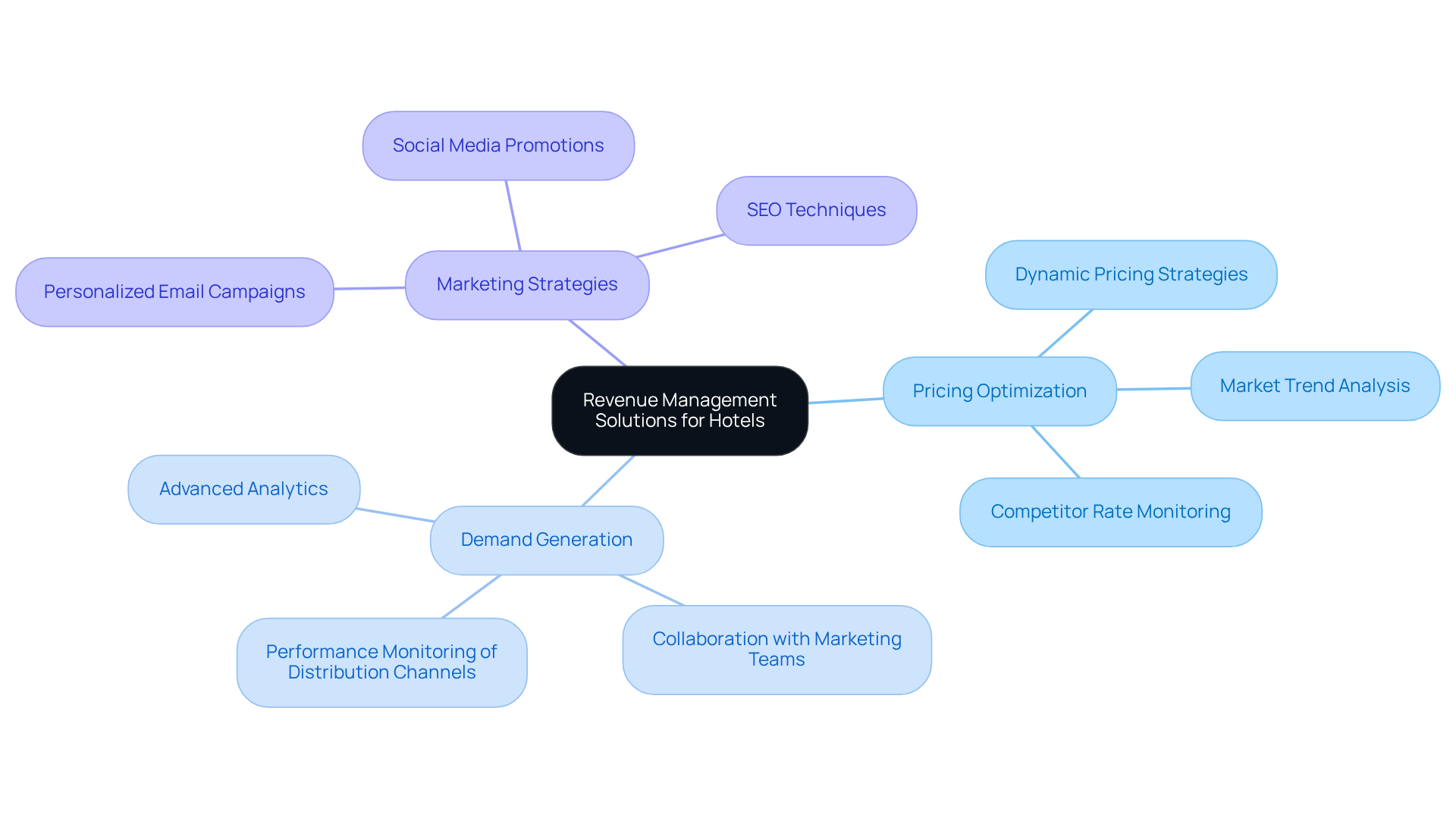
Automation tools integrated into hospitality software are revolutionizing operations by streamlining routine tasks like booking confirmations, invoicing, and visitor communications. This transformation not only alleviates the workload on staff but also significantly reduces the likelihood of errors, enabling teams to concentrate on .
As accommodations embrace these technologies, they are experiencing marked improvements in both operational efficiency and service quality. For example, automated data aggregation can recover thousands of labor hours each month, especially for portfolios managing multiple properties, allowing staff to prioritize strategic initiatives over repetitive tasks.
Furthermore, automation boosts staff efficiency by facilitating quicker check-ins and real-time updates, which are essential in today's competitive landscape. Industry experts assert that automation is vital for lodging operators to maintain competitiveness in 2025 and beyond.
By leveraging hospitality software, accommodations can not only refine their operational workflows but also foster a more personalized and engaging experience for their guests, ultimately enhancing customer loyalty and maximizing revenue potential.
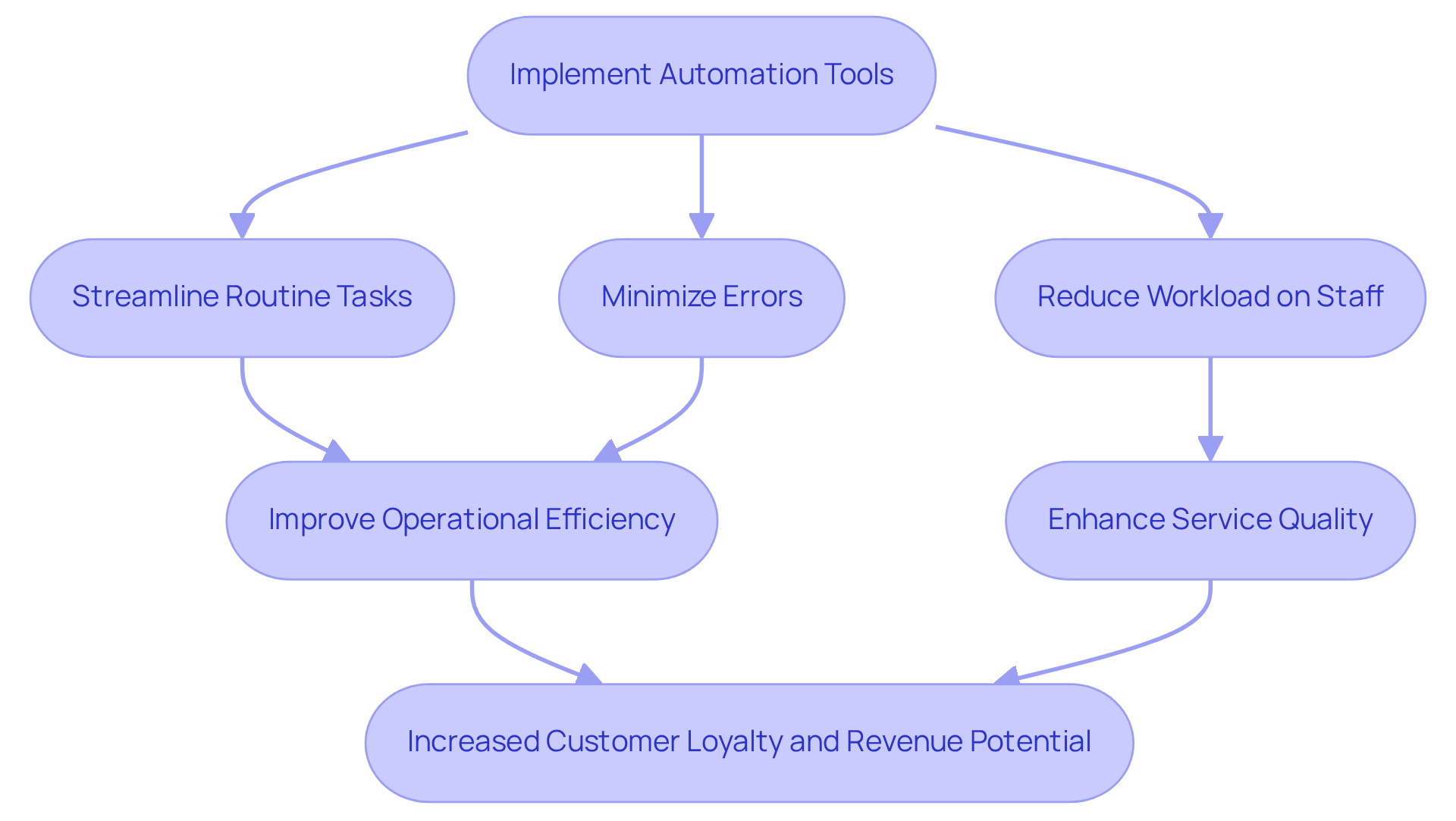
Data analytics tools empower accommodations by providing real-time insights into occupancy rates, guest demographics, and market trends. This capability allows accommodation managers to make informed strategic decisions regarding pricing, marketing initiatives, and service enhancements.
For instance, leveraging data analytics enables the identification of peak booking times, facilitating targeted promotions during off-peak periods to bolster occupancy. Such a proactive approach not only enhances operational efficiency but also elevates guest satisfaction by customizing services to align with customer expectations.
As Dr. Philippe Masset emphasizes, the sophistication of automation and data analytics in hospitality software is poised for significant growth in 2025, heralding a transformation in operational efficiency within the hospitality sector. Furthermore, 89% of accommodations are already utilizing AI for customer service, leading to an impressive 73% reduction in response times.
This integration of is crucial for establishments aiming to stay competitive and adaptable to evolving market demands, particularly in aligning promotional strategies with data-driven insights.
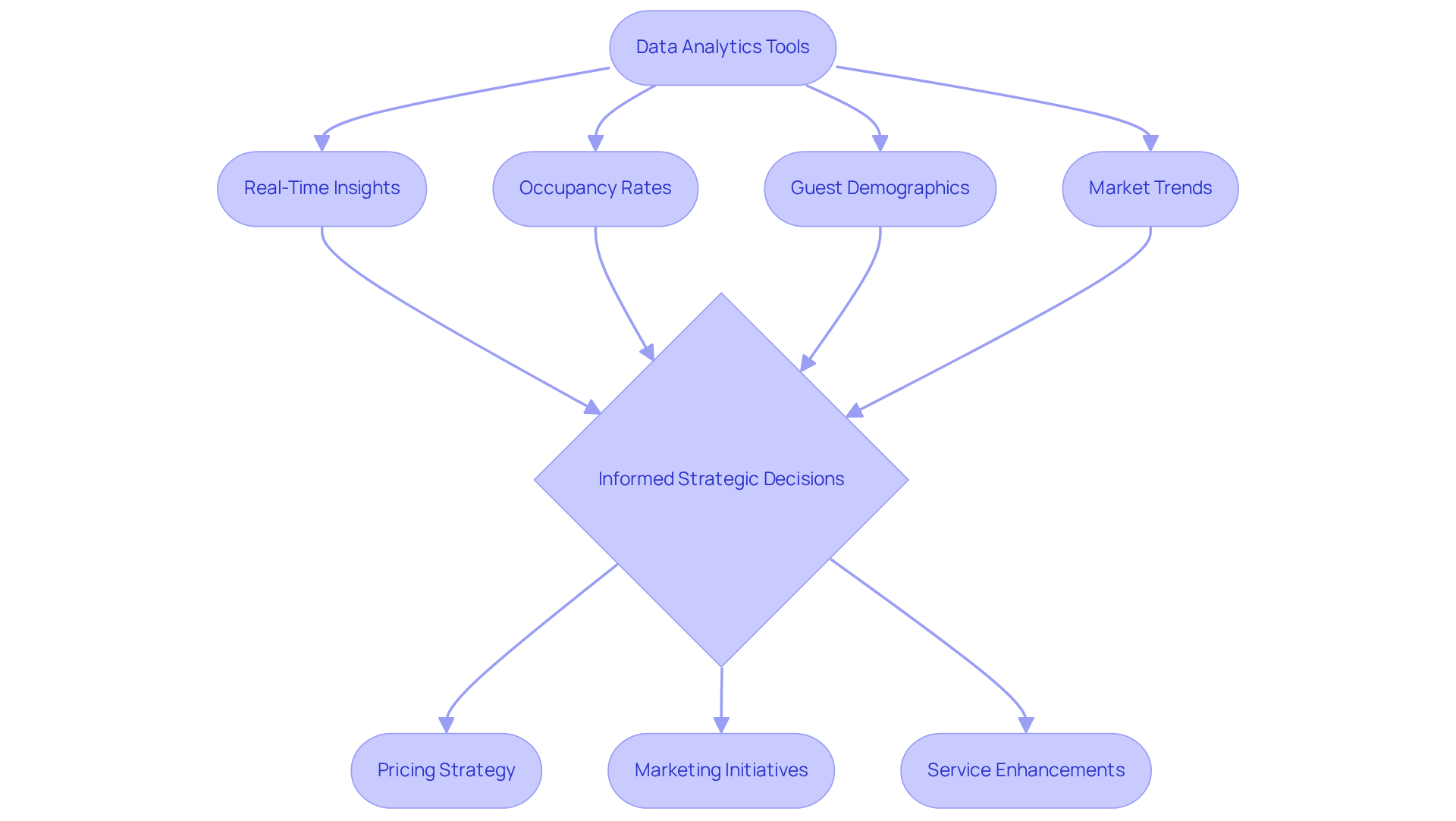
Incorporating a robust CRM system into hospitality software allows establishments to meticulously monitor visitor interactions, preferences, and feedback. This invaluable information can be leveraged to tailor promotional efforts and enhance service delivery, significantly elevating . By cultivating strong connections with patrons, accommodations not only foster loyalty but also encourage return visits—essential elements for sustained revenue growth.
Statistics indicate that enhancing customer retention by merely 5% can result in profit increases ranging from 25% to 95%, highlighting the financial advantages of personalized marketing strategies in hospitality.
Furthermore, hospitality software with seamless CRM integration cultivates a culture of service excellence, empowering accommodations to anticipate visitor needs and consistently exceed expectations.
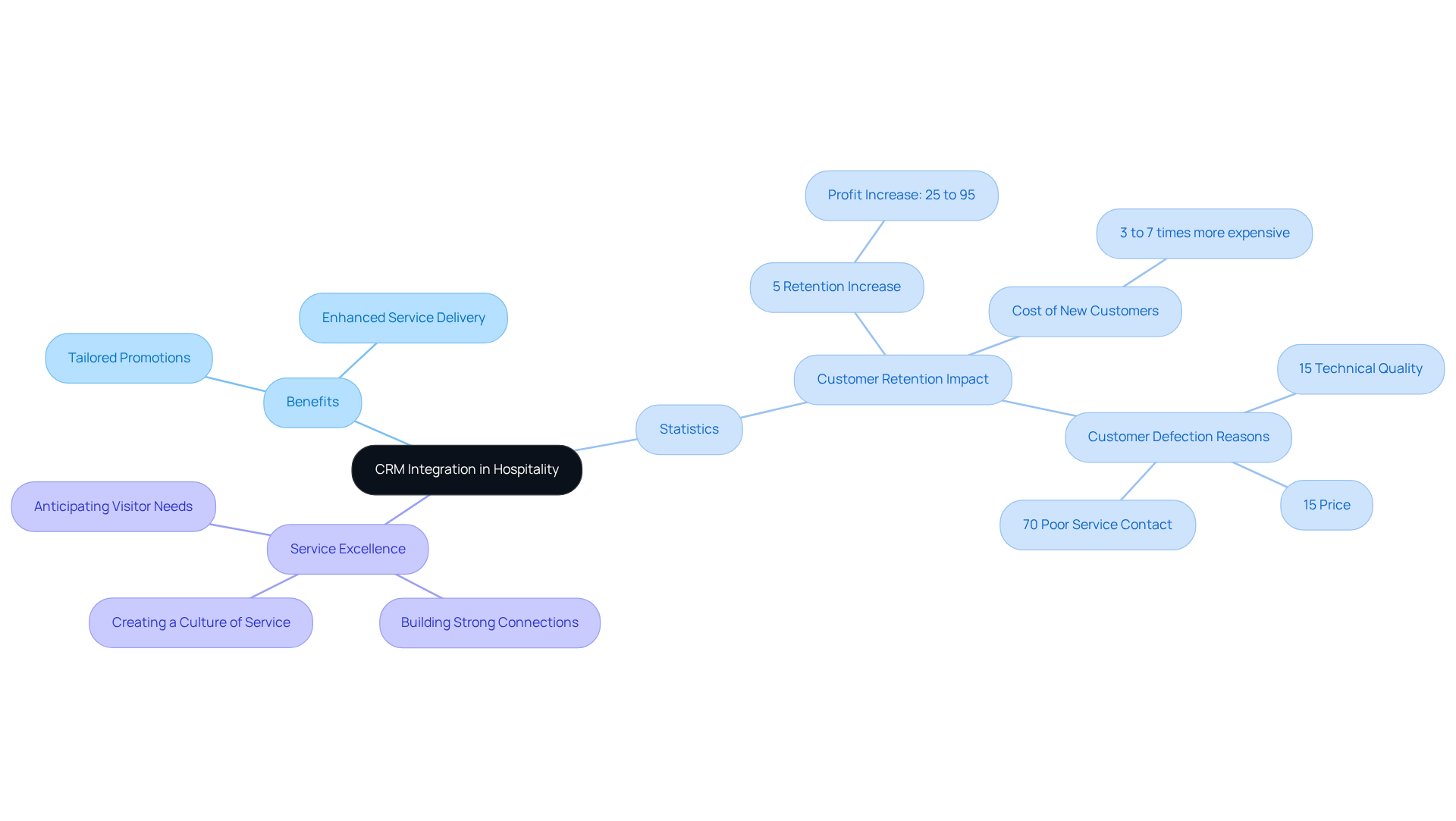
Mobile accessibility in hospitality software enables managers to oversee operations, address customer inquiries, and handle reservations from any location. This flexibility is particularly advantageous for who must remain connected with their teams and guests. Furthermore, by leveraging mobile technology, accommodations can significantly boost their responsiveness and enhance overall operational efficiency. In an industry where customer satisfaction is paramount, the ability to manage tasks remotely through hospitality software is not just a convenience; it is a necessity that can lead to improved guest experiences and increased loyalty.
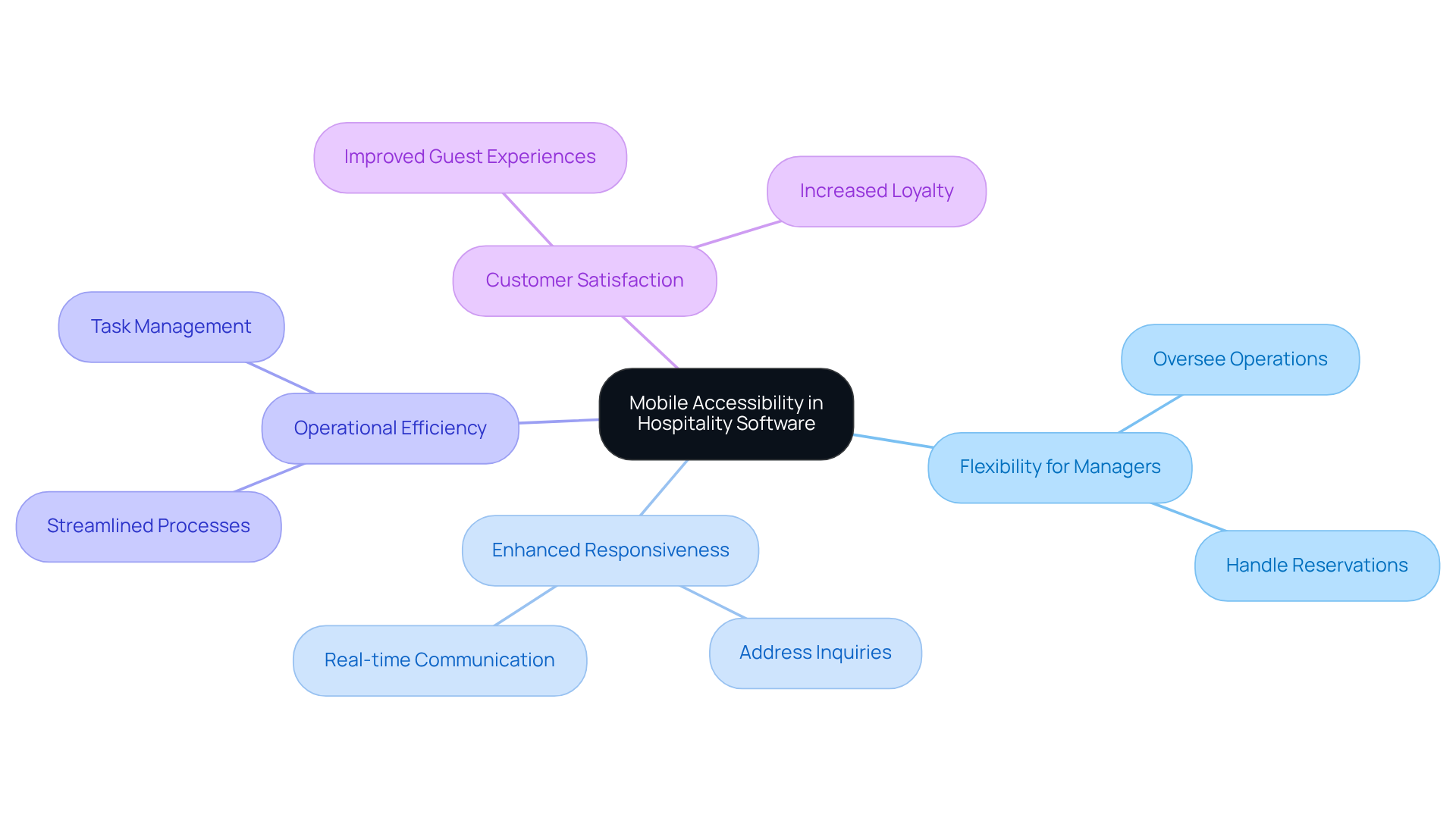
Channel management tools are essential for establishments seeking to enhance their online presence through efficient management of listings across various booking platforms. This strategy guarantees consistent room availability and pricing, significantly mitigating the risk of overbookings. By optimizing distribution channels, hotels can elevate their visibility, attracting a broader pool of potential guests. This strategic management not only maximizes income potential but also drives occupancy rates higher.
Properties that utilize real-time inventory management through hospitality software have reported an average revenue boost of 15%, underscoring the tangible benefits of effective channel management within the competitive hospitality landscape. Furthermore, integrating hospitality software with booking platforms is crucial for streamlining operations and enhancing visitor satisfaction.
Specific marketing strategies, such as targeted promotions and personalized guest experiences, can amplify the impact of channel management, resulting in reduced labor costs and increased direct bookings. This comprehensive approach reinforces the for lodging proprietors, ensuring they remain competitive and profitable.
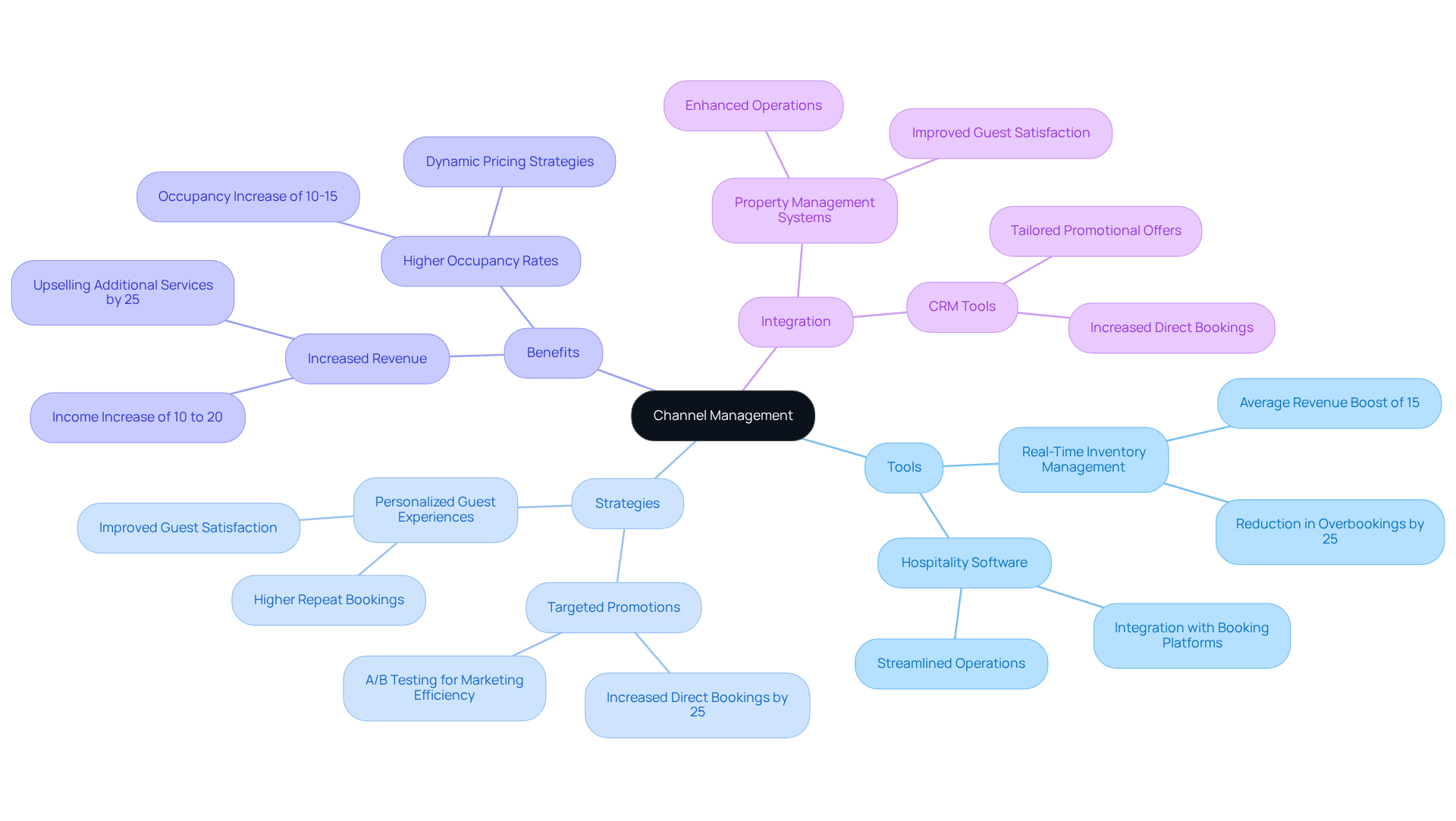
Hospitality software includes integrated payment processing solutions, which are essential components for enabling establishments to manage transactions with both security and efficiency. These systems streamline the payment process for guests, significantly reducing the risk of fraud and chargebacks. By prioritizing secure and user-friendly payment experiences, hotels not only enhance guest satisfaction but also cultivate loyalty, encouraging repeat bookings.
As industry leaders assert, a seamless transaction process is foundational to the modern customer experience, with technology acting as a critical enabler. Companies that invest in secure payment options often observe a direct correlation between transaction safety and customer loyalty, ultimately leading to increased revenue. Research indicates that 1 in 3 consumers will abandon a brand after a single negative experience, underscoring the necessity of for customer retention.
Moreover, effective customer service can boost revenue by 21%, highlighting the financial advantages of prioritizing secure transactions. By adopting hospitality software solutions, accommodations can foster a more positive and trustworthy environment for their guests, reinforcing their commitment to exceptional service. Hotel owners must regularly review and update their payment processing systems to ensure compliance with the latest security standards.
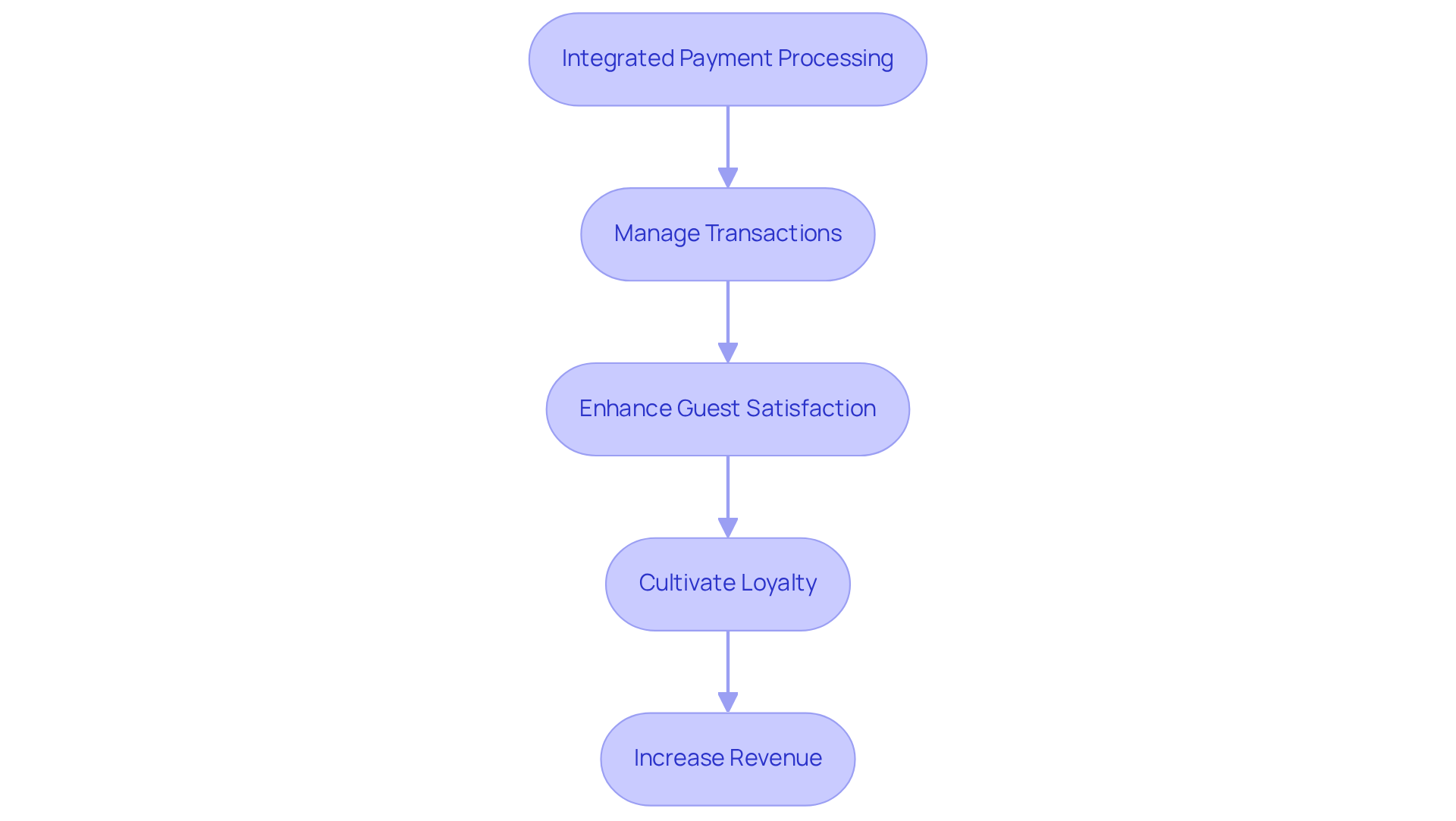
Customizable reporting tools empower accommodations to generate insights that are precisely aligned with their unique objectives. By focusing on critical performance metrics (KPIs) such as:
Managers can identify trends and make informed, data-driven decisions that significantly enhance operational performance. A survey conducted by Oracle Hospitality and Skift, involving over 600 accommodation providers, revealed that establishments leveraging customized reporting have experienced a notable improvement in their ability to adapt strategies effectively, leading to superior financial outcomes and enhanced visitor experiences.
Furthermore, data analytics plays a crucial role in revenue management and forecasting, enabling accommodations to make informed pricing decisions based on demand trends. This tailored approach not only highlights the metrics that are vital to a property's success but also fosters a culture of by encouraging establishments to respond to visitor feedback and evolving expectations.
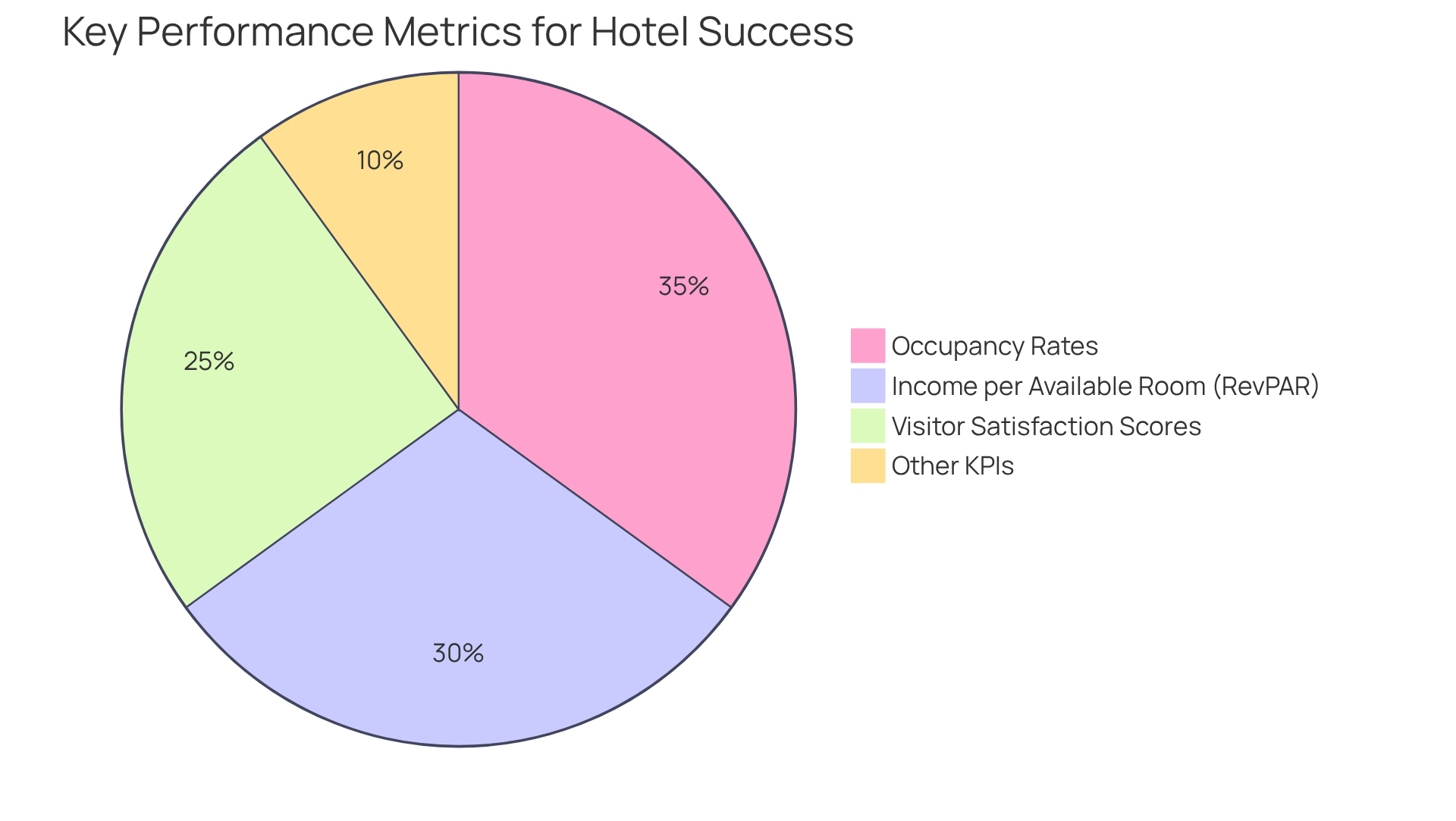
Automation tools empower establishments to craft and execute targeted promotional campaigns that effectively engage prospective visitors at optimal times. By automating processes such as email marketing, social media engagement, and promotional offers, establishments can significantly elevate their visibility in a competitive landscape.
To maximize the impact of these tools, establishments should adopt specific strategies, including:
This strategic approach not only boosts reservations but also cultivates brand loyalty, as visitors are more inclined to return to establishments that actively engage with them. Notably, companies utilizing automation for promotion have reported an astonishing 451% increase in qualified leads, highlighting the power of personalized outreach.
Furthermore, as the hospitality sector continues to evolve, leveraging automation becomes essential for establishments aiming to enhance visibility and build lasting visitor relationships. As marketing tech expert Krunal Vaghasiya asserts, "The foremost benefit of marketing automation is enhancing the customer experience," a critical factor for maintaining a competitive edge.
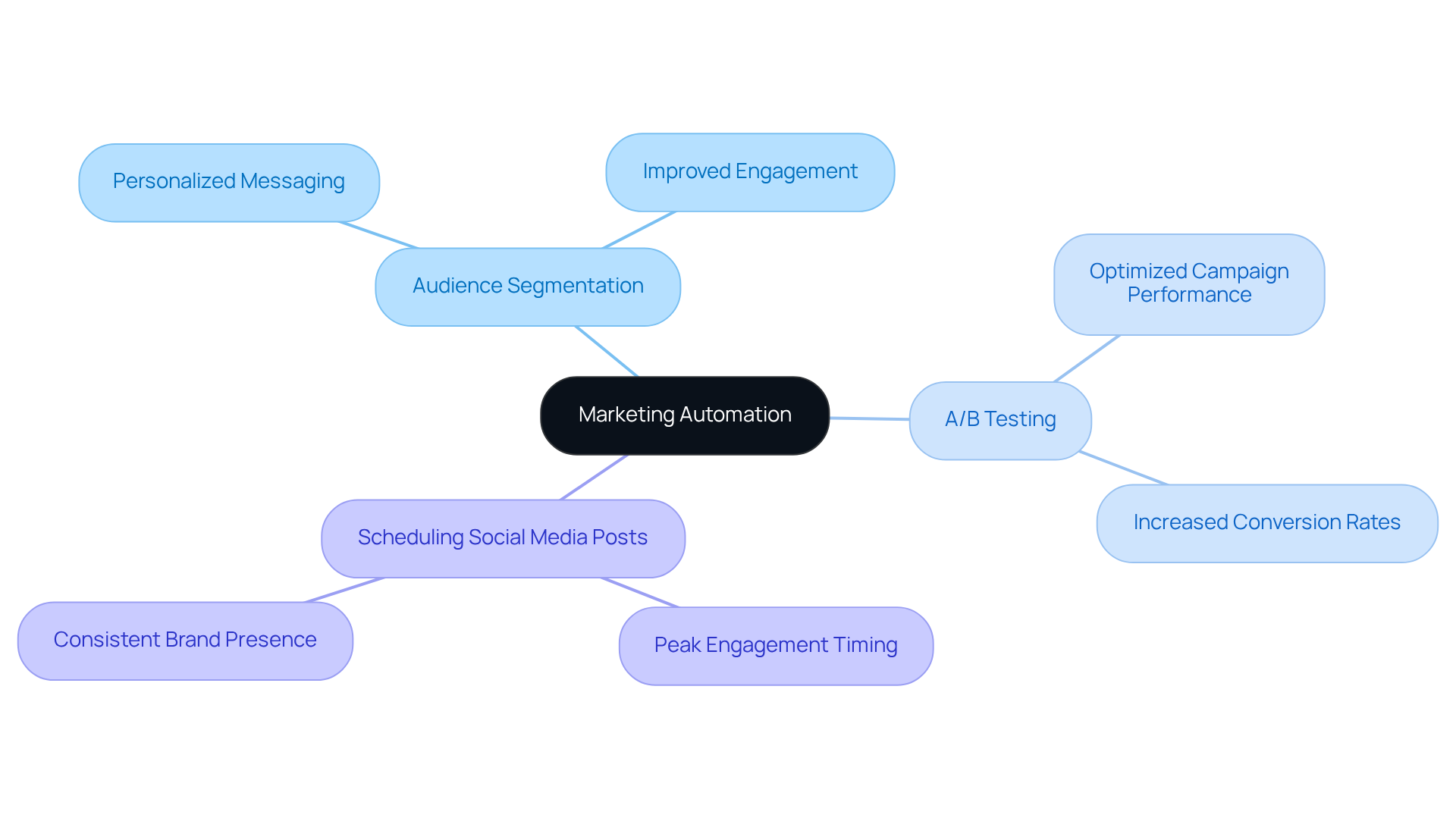
A user-friendly interface in hospitality software tackles a critical challenge: the training process for staff. By streamlining this process, establishments enable their teams to quickly adapt to new systems and procedures. This simplicity not only boosts operational efficiency but also elevates employee morale, as staff members gain confidence in their ability to perform their roles effectively. Investing in user-friendly hospitality software design is essential for establishments aiming to equip their teams with the tools necessary to provide outstanding visitor experiences.
Furthermore, industry experts highlight that effective staff training is essential for operational success, with hospitality software playing a pivotal role in achieving this goal. Consider the average salary for hospitality operations managers in the U.S., which is around $55,000; effective training can significantly influence financial performance. Moreover, as standalone accommodations face challenges in 2025—such as visitor personalization and revenue enhancement—improving training procedures through accessible design becomes increasingly essential.
By fostering a more engaged workforce, hotels can ultimately lead to improved service quality and guest satisfaction. This strategic focus on is not merely a trend; it is a fundamental necessity for thriving in the competitive hospitality landscape.
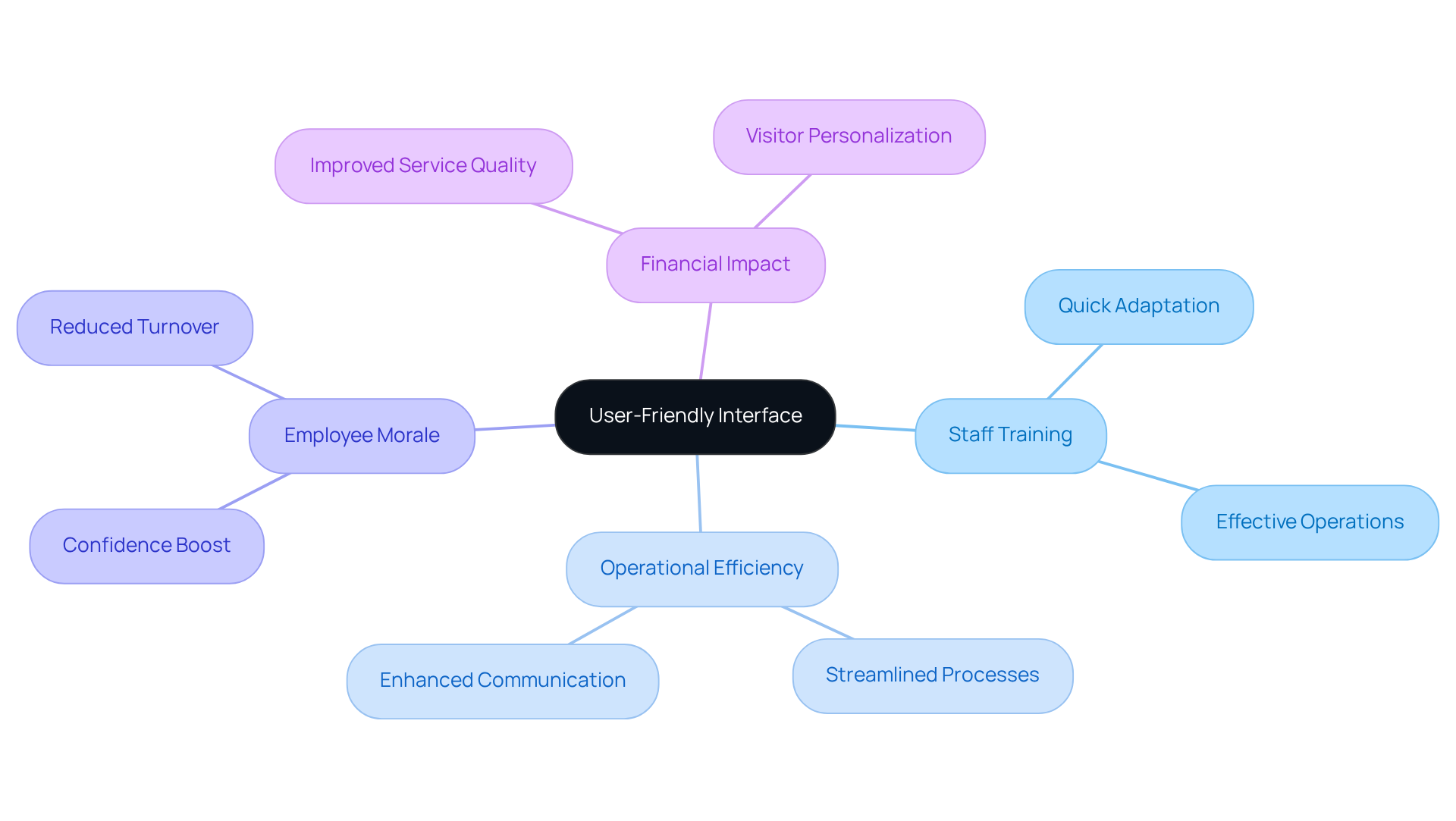
The landscape of hospitality software is rapidly evolving, presenting essential features that empower hotels to enhance operations, drive revenue, and elevate guest experiences. By integrating comprehensive revenue management solutions, automation tools, data analytics, and user-friendly interfaces, hotels can adeptly navigate the complexities of the industry. Each of these components is crucial in ensuring that accommodations not only meet but exceed the expectations of modern travelers.
Key insights from the discussion underscore the significance of:
Furthermore, mobile accessibility and secure payment processing are vital for maintaining competitiveness and fostering customer loyalty. Customizable reporting and marketing automation further empower hotels to tailor their strategies to specific needs and engage guests in a meaningful way.
As the hospitality sector continues to adapt to shifting market dynamics, embracing these essential features is imperative. Hotels that leverage advanced software solutions will not only streamline their operations but also enhance their ability to attract and retain guests. By prioritizing these tools, property owners can position themselves for success in a competitive landscape, ultimately driving profitability and ensuring a memorable experience for every visitor.
What services does Lights On provide for hotels?
Lights On offers a suite of revenue management solutions tailored for accommodations, focusing on pricing optimization, demand generation, and market trend analysis.
How can property owners enhance bookings using Lights On's solutions?
Property owners can implement targeted marketing strategies such as personalized email campaigns, social media promotions, and search engine optimization (SEO) techniques to boost online visibility.
What impact can effective pricing strategies have on hotel profitability?
Effective pricing optimization strategies can lead to substantial income increases, with accommodations reporting profitability enhancements of up to 20%.
How does automation improve operations in the hospitality industry?
Automation tools streamline routine tasks like booking confirmations, invoicing, and visitor communications, reducing staff workload and errors, which allows teams to focus on delivering exceptional guest experiences.
What are the benefits of data analytics for accommodations?
Data analytics tools provide real-time insights into occupancy rates, guest demographics, and market trends, enabling managers to make informed decisions regarding pricing, marketing initiatives, and service enhancements.
How can data analytics enhance guest satisfaction?
By identifying peak booking times and facilitating targeted promotions during off-peak periods, accommodations can customize services to align with customer expectations, which enhances operational efficiency and guest satisfaction.
What is the projected impact of automation and data analytics in hospitality by 2025?
The sophistication of automation and data analytics in hospitality software is expected to grow significantly, improving operational efficiency and competitiveness in the industry.
How prevalent is the use of AI in accommodations for customer service?
Currently, 89% of accommodations are utilizing AI for customer service, which has resulted in a 73% reduction in response times.
Transform your group booking strategies with Lights On and watch your occupancy soar.